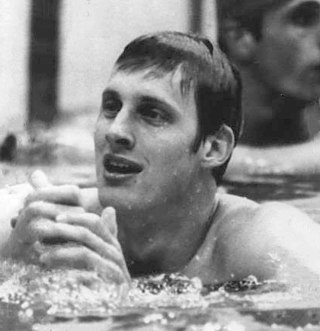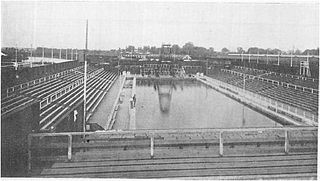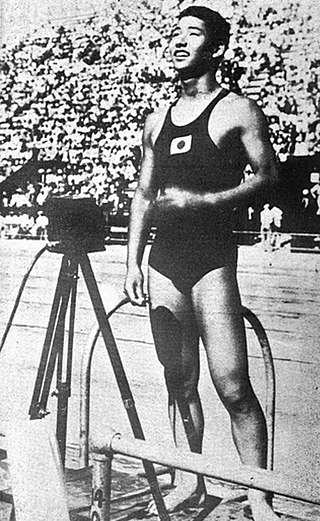
The men's 100 metre freestyle event at the 1976 Summer Olympics took place between July 24 and 25. This was the first time in history that the 100m freestyle was swum under 50 seconds. There were 41 competitors from 27 nations. Nations had been limited to three swimmers each since the 1924 Games. The event was won by Jim Montgomery of the United States, the nation's second consecutive and tenth overall victory in the men's 100 metre freestyle. His countryman Jack Babashoff took silver. Peter Nocke's bronze was the first medal for West Germany in the event, though the United Team of Germany had won a bronze in 1964.
The men's 400 metre freestyle was one of six swimming events on the swimming at the 1908 Summer Olympics programme. Its distance was the median of the 3 individual freestyle event distances. It was the first time an event over 400 metres was held at the Olympics. The competition was held from Monday July 13, 1908 to Thursday July 16, 1908.

The men's 100 metre freestyle was a swimming event held as part of the swimming at the 1912 Summer Olympics programme. It was the fourth appearance of the event, which had not been featured at the 1900 Games. The competition was held from Saturday July 6, 1912, to Wednesday July 10, 1912. Thirty-four swimmers from twelve nations competed. The event was won by Duke Kahanamoku of the United States, the nation's second consecutive victory in the event. Cecil Healy took silver, the only medal in the event for Australasia, the short-lived joint team of Australia and New Zealand. Another American, Ken Huszagh, took bronze.
The men's 400 metre freestyle was a swimming event held as part of the swimming at the 1912 Summer Olympics programme. It was the third appearance of the event, which had been introduced in 1904. The competition was held from Thursday July 11, 1912 to Sunday July 14, 1912.
The men's 100 metre backstroke was a swimming event held as part of the swimming at the 1912 Summer Olympics programme. It was the second appearance of the event, which had been introduced in 1908. In 1904 a 100-yard event was held. The competition was held from Tuesday July 9, 1912 to Saturday July 13, 1912.
The men's 4 × 200 metre freestyle relay was a swimming event held as part of the swimming at the 1912 Summer Olympics programme. It was the second appearance of the event, which had been introduced in 1908. The competition was held on Friday July 12, 1912 and Monday July 15, 1912.
The men's 200 metre breaststroke was a swimming event held as part of the swimming at the 1912 Summer Olympics programme. It was the second appearance of the event, which had been introduced in 1908. Germany swept the medals in the event. The competition was held from Sunday July 7, 1912 to Friday July 12, 1912.
The men's 400 metre breaststroke was a swimming event held as part of the swimming competition at the 1912 Summer Olympics. It was the second appearance of the event, which had been introduced in 1904. The competition was held from Monday July 8, 1912 to Friday July 12, 1912.

The women's 100 metre freestyle was a swimming event held as part of the swimming at the 1912 Summer Olympics programme. It was the first appearance of a women's event in Olympic swimming, followed closely by the 4×100 metre free relay. The competition was held from Monday to Friday, 8 to 12 July 1912.

The men's 100 metre freestyle was a swimming event held as part of the swimming at the 1920 Summer Olympics programme. It was the fourth appearance of the event. A total of 31 swimmers from 15 nations competed in the event, which was held from August 22 to August 29, 1920. Nations were limited to four swimmers each. The United States swept the medals, and Duke Kahanamoku broke his own Olympic record in the semifinals and bettered his time again in the final to successfully defend his championship from 1912. Kahanamoku was the first man to successfully defend an Olympic 100 metres freestyle title and third man to win multiple medals of any color in the event.
The men's 100 metre freestyle was a swimming event held as part of the swimming at the 1924 Summer Olympics programme. It was the sixth appearance of the event, which had not been featured at the 1900 Games. The competition was held on Saturday July 19, 1924 and on Sunday July 20, 1924. There were 30 competitors from 15 nations. Nations were limited to three swimmers each, down from four in 1920. The United States swept the medals for the second consecutive Games, winning its fourth consecutive gold medal. Johnny Weissmuller beat two-time defending champion Duke Kahanamoku in the final. Kahanamoku was the first man to win three medals in the event. His brother Samuel Kahanamoku earned the bronze medal.

The men's 100 metre freestyle was a swimming event held as part of the swimming at the 1928 Summer Olympics programme. It was the seventh appearance of the event, which had not been featured only at the 1900 Games. The competition was held on Friday and Saturday, 10 and 11 August 1928. Thirty swimmers from 17 nations competed. Nations had been limited to three swimmers each since the 1924 Games. Johnny Weissmuller of the United States repeated as gold medalist in the event, the second man to do so. It was the fifth consecutive victory for an American swimmer in the men's 100 metre freestyle. István Bárány earned Hungary's first medal in the event since 1908 with his silver. Katsuo Takaishi's bronze was Japan's first men's 100 metre freestyle medal. Bárány and Takaishi prevented the Americans from sweeping the medals a third consecutive time, as the United States swimmers finished first, fourth, and fifth.

The men's 100 metre freestyle was a swimming event held as part of the swimming at the 1932 Summer Olympics programme. It was the eighth appearance of the event, which had not been featured only at the 1900 Games. The competition was held from Saturday August 6, 1932 to Sunday August 7, 1932. Twenty-two swimmers from ten nations competed. Nations had been limited to three swimmers each since the 1924 Games. The event was won by Yasuji Miyazaki of Japan, snapping a five-Games American win streak. Japan was only the third nation to win a gold medal in the event. The final was entirely made up of Japanese and American swimmers, three each; Japan took the top two places as Tatsugo Kawaishi earned silver. The top American, Albert Schwartz, earned bronze. While the American win streak had ended at five, the nation's podium streak ran to seven Games.

The men's 100 metre freestyle was a swimming event held as part of the swimming at the 1936 Summer Olympics programme. It was the ninth appearance of the event, which had not been featured only at the 1900 Games. The competition was held on Saturday and Sunday, 8 and 9 August 1936. Forty-five swimmers from 23 nations competed. Nations had been limited to three swimmers each since the 1924 Games. The event was won by Ferenc Csik of Hungary, the nation's first victory in the event since 1904 and third overall. For the second consecutive Games, Japan took two medals in the 100 metre freestyle, this time silver and bronze. The United States' seven-Games medal streak in the event ended as the nation's best result was sixth place by Peter Fick.

The men's 100 metre freestyle event at the 1948 Olympic Games took place between 30 and 31 July at the Empire Pool. There were 41 competitors from 19 nations. Nations had been limited to three swimmers each since the 1924 Games. The event was won by Wally Ris, returning the United States to the podium in the event after a one-Games absence broke a seven-Games streak. It was the sixth victory for an American in the 100 metre freestyle, most of any nation. Another American, Alan Ford, took silver. Géza Kádas of Hungary earned bronze, the nation's third medal in four Games. Japan's three-Games medal streak in the event ended with no Japanese swimmers competing due to the nation not being invited after World War II.

The men's 100 metre freestyle event at the 1952 Summer Olympics took place between 26 and 27 July at the Helsinki Swimming Stadium. There were 61 competitors from 33 nations. Nations had been limited to three swimmers each since the 1924 Games. The event was won by Clarke Scholes of the United States, the nation's second consecutive and seventh overall victory in the men's 100 metre freestyle. Japan, absent from the 1948 Games after World War II, returned to the podium in the event with Hiroshi Suzuki's silver. Göran Larsson earned Sweden's first medal in the event since 1908 with his bronze.

The men's 100 metre freestyle event at the 1956 Olympic Games took place between 29 and 30 November. There were 34 competitors from 19 nations. Nations had been limited to three swimmers each since the 1924 Games. The event was won by Jon Henricks of Australia, the nation's first medal in the event. Australia would win a second 0.4 seconds later and a third 0.9 seconds after that, sweeping the podium—the first sweep in the men's 100 metre freestyle since the United States did it in 1920 and 1924, and the first sweep of any event by Australian competitors. This year, the Americans finished fourth through sixth. It was the first time since 1924 that Japan had competed but not medaled.

The men's 100 metre freestyle event at the 1964 Olympic Games took place between October 11 and 12. There were 66 competitors from 33 nations. Nations were again able to bring up to three swimmers each after a one-Games limit of two in 1960. The event was won by Don Schollander of the United States, the nation's first victory in the event since 1952 and eighth overall. Great Britain and the United Team of Germany both earned their first medal in the men's 100 metre freestyle.

The men's 100 metre freestyle event at the 1968 Olympic Games took place between 18 and 19 October. There were 64 competitors from 34 nations. Nations had been limited to three swimmers each since the 1924 Games. The event was won by Michael Wenden of Australia, the nation's third victory in four Games. Americans Ken Walsh and Mark Spitz took silver and bronze, respectively.

The men's 100 metre freestyle event at the 1972 Olympic Games took place between September 2 and 3. There were 48 competitors from 29 nations. Nations had been limited to three swimmers each since the 1924 Games. The event was won by Mark Spitz of the United States, his then-record sixth gold medal in a single Games. It was the ninth victory in the event for an American, most of any nation. Jerry Heidenreich, also of the United States, took silver. Soviet swimmer Vladimir Bure earned bronze, the nation's first medal in the men's 100 metre freestyle.














